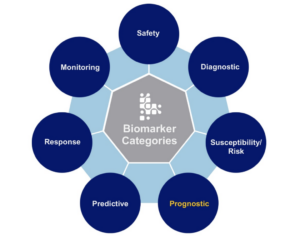What is a biomarker?
A common term in medical testing is “biomarker” but what exactly does the term mean? In layman’s terms, a “biomarker” is anything that can be used to measure the presence or severity of a particular disease. According to the FDA, a biomarker is “a defined characteristic that is measured as an indicator of normal biological processes, pathogenic processes, or responses to an exposure or intervention, including therapeutic interventions.”
As it relates to blood testing, biomarkers can be particularly useful to measure one’s risk for developing a disease, or even the severity of the disease if it is present. Biomarkers play a major role in medicine, and many labs with unique testing have identified biomarkers for their tests.
Biomarker Characteristics
With the rise of genomics and advances in medicine, biomarkers are frequently being studied for their potential for early diagnosis and even disease treatment options. Biomarkers may include the following characteristics:
- Molecular: These markers have biophysical properties, so they are likely to be present in bio-samples, such as plasma, serum, cerebrospinal fluid, and biopsy. An example is blood glucose.
- Radiographic: Markers that are viewed from imaging studies, like CT scans, MRIs, etc. An example is tumor size.
- Histologic: These reflect alterations, both biochemical and molecular, in cells, tissues, or fluids. An example is determining the stages of cancer.
- Physiologic: Examples include blood pressure, heart rate, and other measures of bodily processes.
Biomarker Categories
Per the FDA, there are seven categories of biomarkers. These categories are defined by the general application of the biomarker. (All definitions of biomarkers per FDA-NIH Biomarker Working Group)

Image from FDA.gov: Biomarker Terminology: Speaking The Same Language
- Prognostic: Used to identify the likelihood of a clinical event, disease recurrence, or progression in patients who have the disease or medical condition of interest.
- Example: BRCA 1/2 to determine likelihood of second cancer in women with breast cancer.
- Predictive: Used to identify those patients who are more likely than others without the biomarker to experience a favorable or unfavorable effect from a medical product (i.e., medicine).
- Example: Prostate specific antigen (PSA) to monitor men after surgery or radiation therapy for prostate cancer to check for recurrence.
- Response: Used to show that a biological response (beneficial or harmful) has occurred in an individual exposed to a medical product.
- Example: HbA1c is used to evaluate diabetes control following treatment with an antihyperglycemic agent.
- Monitoring: These are repeatedly measured to assess the status of a disease or medical condition, or for evidence of exposure to a medical product.
- Example: Serum low-density lipoprotein (LDL) for a patient’s response to lipid lowering drugs.
- Safety: Measured before or after an exposure to a medical product to indicate the likelihood, presence, or extent of toxicity as an adverse effect.
- Example: Corrected QT interval (QTc) to assess the potential for drugs to induce ventricular tachycardia.
- Diagnostic: Used to detect or confirm presence of a disease or condition.
- Example: Glomerular filtration rate (GFR) to detect chronic kidney disease.
- Susceptibility/Risk: Used to indicate the potential for developing a disease or condition in a patient that does not currently have it.
- Example: Apolipoprotein C to determine a patient’s predisposition to developing Alzheimer’s disease.
Use of Biomarkers
Biomarkers can be used in a variety of ways, and have become increasingly popular when developing new testing. Examples include measuring the progress of disease, evaluating effective therapies for cancer treatment, clinical trials, drug target identification/response and more.
Many of the labs on the MOMS platform have identified particular biomarkers to measure in their unique testing. For more information about the capabilities of the MOMS partner labs, contact us today.
Before you go…
